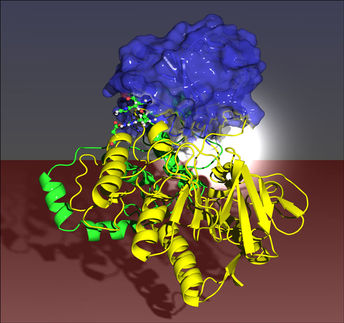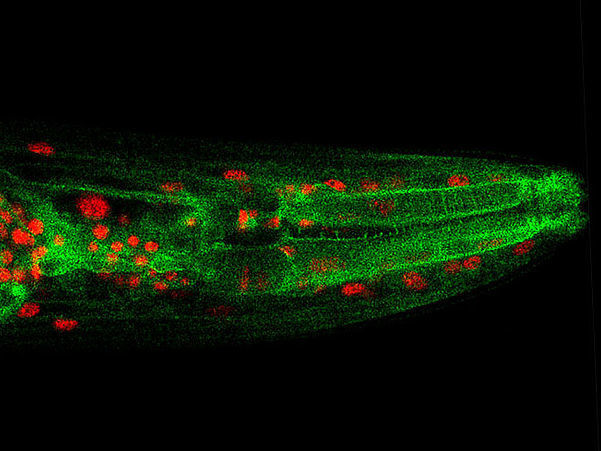Live from the Lymph Node
GBF researchers film immune cells in action
Advertisement
Scientists at the German Research Centre for biotechnology (GBF) in Braunschweig have successfully filmed individual cells migrating within a functioning lymph node. "We are the first in Europe to have taken such pictures," explains GBF researcher Dr. Matthias Gunzer.
The new findings gleaned from observing immune cells in action in a living organism have been unveiled by Gunzer and his team in an online draft ahead of publication of the scientific journal, Blood. The researchers hope to gain a deeper understanding of how our immune system functions from their detailed study of lymph node processes. "Once we know how the immune system works in a healthy organism," says Gunzer, "we can then find out what went wrong with our bodily defenses in such instances as allergies, auto-immune ailments or AIDS. This could eventually help the medical profession discover new treatments and therapies."
When a pathogen invades a human organism, our immune system dispatches specialized effector cells into battle to either fight the intruder with antibodies or to kill off the infected body cells. In order for our immune defenses to know exactly what needs to be done, they must first be able to recognize the distinguishing features of the invading pathogen. The enabling factor here are the so-called antigen presenting cells, or APCs. They collect snippets of the intruding bacteria or viruses and "show" these to the effector cells - sort of like a police mug shot. This process takes place in the lymph nodes and was something that until now could only be replicated in a test tube.
When Matthias Gunzer and his colleagues began observing how APCs function and how they communicate with effector cells in the lymph nodes they were able right away to revise one of the accepted basic precepts of immunology. "In the past we all thought that the contacts between APC and the immune cells were very long and intense, so that the effector cells could be properly activated," says Gunzer, "but what we discovered instead was that there were also very short, almost fleeting, contacts that led nonetheless to effector cells recognizing the right pathogen features." Whether the contacts last for seconds or hours, strongly depends on the type of APCs that are involved, Gunzer emphasises.
Intensive Care and High-Tech Microscopes
Because studies like these cannot be conducted on human beings, the GBF scientists focused their microscopes on the lymph nodes of mice. "We developed a veritable intensive care unit for mice to conduct these experiments," notes Gunzer. The mice were given a full anesthetic and put on a respirator - the same way a person would be for surgery. Since lymph nodes are located directly under the skin only a very superficial incision was necessary to expose and examine them.
For these studies, both the medical procedures and the microscopes had to be state-of-the-art technology. Only with confocal or dual-photon microscopes - two very complex and specialised optical devices - one can look deep into bodily tissue without destroying it.
The expertise needed for such experiments is not widespread, says Gunzer: "Besides us, there are only two research groups in the U.S. which have conducted similar studies and written about them."
Other news from the department science
Most read news
More news from our other portals
See the theme worlds for related content
Topic world Antibodies
Antibodies are specialized molecules of our immune system that can specifically recognize and neutralize pathogens or foreign substances. Antibody research in biotech and pharma has recognized this natural defense potential and is working intensively to make it therapeutically useful. From monoclonal antibodies used against cancer or autoimmune diseases to antibody-drug conjugates that specifically transport drugs to disease cells - the possibilities are enormous

Topic world Antibodies
Antibodies are specialized molecules of our immune system that can specifically recognize and neutralize pathogens or foreign substances. Antibody research in biotech and pharma has recognized this natural defense potential and is working intensively to make it therapeutically useful. From monoclonal antibodies used against cancer or autoimmune diseases to antibody-drug conjugates that specifically transport drugs to disease cells - the possibilities are enormous





























































